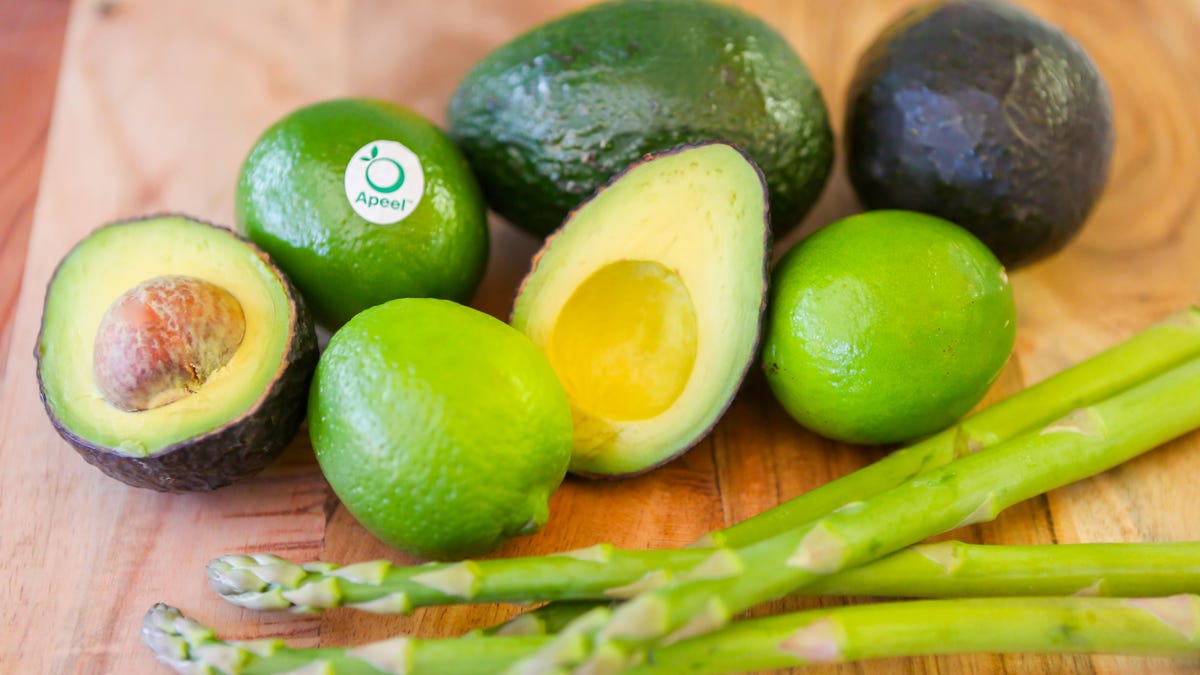Apeel Sciences brings its super avocados to 1,100 Kroger stores
The company is also introducing its new, longer-lasting limes and asparagus, claiming to double or even triple shelf life.

Apeel Sciences has figured out how to extend the salad days of fruits and vegetables -- and it's bringing the technology to the avocado aisle of 1,100 Kroger grocery stores in the US, starting this month.
The extra longevity comes from Apeel's special, plant-derived formulation that's applied -- like a second skin -- to a variety of produce. The process can double or, in some cases, triple shelf life. The companies expect the partnership to prevent millions of avocados annually from ending up in landfills.
Kroger, the largest grocery retailer in the US, began selling Apeel avocados exclusively in 109 of its stores earlier this year. Because of the resulting reduction in waste, Apeel says its avocados cost the same or less than other avocados. The company's produce is currently distributed by AWG, the largest food wholesaler to independently owned supermarkets, and is also sold in Costco and Harps Food Stores.
Apeel has applied for 17 patents, so far, in support of its essential innovation: the development of a secondary peel that restricts water and carbon dioxide from escaping from plants -- and oxygen from coming in. "We build an optimized microclimate in each piece of produce," Apeel CEO James Rogers told me.
A video posted in March compares the lifespans of Apeel fruits and vegetables -- including asparagus, green beans, artichokes, tomatoes, strawberries, apples, bananas and limes -- with that of their untreated counterparts. "It doesn't make a piece of fruit any better," Rogers said. "It just slows it down from getting worse."
The formulation differs from category to category. Apeel extracts molecules from one plant and applies them to the surface of another. The coating is only a couple of hundred nanometers thick, and, as a result, the company claims that there is no perceptible change in the taste, appearance or feel. "We use nature's own defense mechanism," said Rogers.
Today, Apeel's proprietary formulation may be applied at a farm or supplier location or once it arrives at a distributor or retail outlet in the US. Apeel's asparagus, for example, gets treated at the packing house in Peru. At that point, it should last for about 30 days, compared with the 12 days that the average bunch of asparagus lasts. According to Rogers, Apeel's avocados, which are treated after they arrive in the US, will remain ripe for an additional two to four days.
So far, Apeel has developed formulations for about 50 different kinds of produce including apples, artichokes, bananas, beans, blueberries and tomatoes. The company also announced today that it would begin selling limes and asparagus in Kroger's stores around Cincinnati, Ohio, later this fall.
Kroger and Apeel both cite lofty aims with their collaboration. Kroger has promoted the initiative under its "Zero Hunger/Zero Waste" program that raises money to mitigate hunger and reduce food waste. In the US, roughly one in eight people struggle with hunger and between 30% and 40% of the food produced is thrown away.
Produce that lasts longer -- on store shelves as well as in restaurants and homes -- has environmental benefits beyond diverting waste from landfills, however. Apeel and Kroger say that their partnership will help preserve dozens of acres of farmland and save over a billion gallons of water per year.
And it may also help reduce carbon emissions. A bunch of asparagus that would normally be transported by airplane can now be shipped on a boat, with a dramatically lower environmental impact. (Because it is transported almost exclusively by air due to its short shelf life, asparagus is currently among the most expensive types of produce -- from both an environmental and financial perspective.) According to Dr. Tristan Smith, a professor at the University College of London and an expert on shipping emissions, freight moved by aviation produces approximately 100 times more greenhouse gas per metric ton of cargo than shipping by sea.
James Rogers launched Apeel Sciences in 2012 as a graduate student at the University of Santa Barbara, with a $100,000 grant from the Bill and Melinda Gates Foundation. The company has since raised $110 million from investors including Andreessen Horowitz, Viking Global Investors and Upfront Ventures. Former Whole Foods Market co-CEO Walter Robb joined the company's board of directors in 2018.
Originally published Sept. 18, 3:30 a.m. PT.
Update, 8 a.m.: Adds information about Apeel's patent applications.

